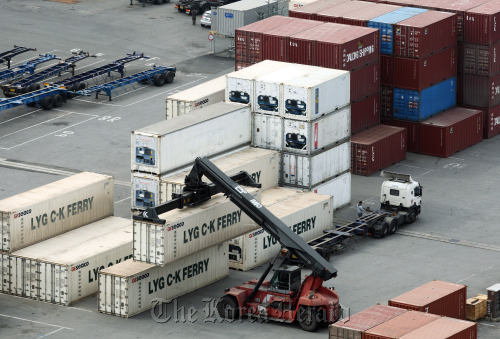Dimmer U.S. economic outlook, rising inflation at home still pose risk
As the U.S. Federal Reserve pledged to keep its benchmark interest rate at near zero through mid-2013 helping Wall Street to stage a rebound Tuesday, investors in Seoul also seemed less nervous.
Still, a bigger question remains: What will be the impact on the Korean economy?
Even before the unprecedented downgrade of the U.S. credit rating on Friday, Korea was already faced with growing risks to its export-dependent economy amid a flurry of warning signs such as surging inflation and mounting household debt.
 |
A straddle carrier transports a shipping container at the Port of Pyeongtaek. (Bloomberg) |
The Federal Open Market Committee reaffirmed its will to prop up the world’s biggest economy by keeping rates low in a bid to restore confidence among investors who demonstrated panicky sentiment in this week.
The gesture was largely seen as a positive step, particularly at a time when the eurozone is grappling with its own debt crisis and jittery investors are rushing to seek safe havens in gold and other less risky investment instruments, including U.S. Treasury bonds despite the first-ever cut of the country’s credit rating by a notch to “AA +.”
Analysts in Seoul expressed cautious optimism on the Fed’s decision to “warrant exceptionally low levels for the federal funds rate at least through mid-2013” in connection with the Korean economy.
“As the Fed has not completely ruled out an additional measure such as a third round of quantitative easing, the markets accepted the development as largely positive,” said Lee Dong-soo, chief economist at HanMag Securities. “The risk factor that sharply rose in the wake of the U.S. credit rating downgrade seems to have softened in a way that assures the bond markets among others.”
Jeong Yong-taek at KTB Investment & Securities said the FOMC’s signal goes beyond “lip service” and is a better development than expected: “The extension of low interest rates to mid-2013 is about half a year longer than we previously forecast, and this is which is a most significant move that will affect future investment decisions greatly.”
Any improvement in the outlook for the U.S. economy is perceived as a plus for the Korean economy, though authorities here stressed on Tuesday the country’s export to the U.S. stood at about 10 percent in a bid to brush off concerns sparked by a steep fall on the stock market in the past week.
But the Fed’s statement contains disconcerting details of the U.S. economy that could worry Korean authorities: “Economic growth so far this year has been considerably slower than the committee had expected.” The Fed also cast a dimmer outlook by expecting “a somewhat slower pace of recovery over coming quarters” and increased “downside risks to the economic outlook.”
The Bank of Korea issued a report on Wednesday saying that the government agencies held a joint meeting to assess the latest turbulence in the global market and concluded it is not desirable to overreact as the country’s fundamentals remain solid. To minimize volatility in the market, the Korean financial regulators on Tuesday put a ban on so-called short selling from Aug. 10 to Nov. 9, targeting investors who bet on a slide in securities.
According to the BOK, the proportion of short-term foreign borrowing slid to 38.4 percent and the country’s foreign reserves grew to $311 billion as of end-July, up from $201 billion in late 2008 when the bankruptcy of Lehman Brothers sent the global markets plunging.
Korea’s jobless rate also edged down to 3.3 percent in July, compared with 3.7 percent a year earlier, according to Statistics Korea.
But Asia’s fourth-largest economy still confronts rising consumer prices, which jumped 4.7 percent in July from a year earlier, staying above the government’s target inflation range of 4 percent for seven months in a row amid growing worries over its impact on the overall economy.
The central bank, which kept the benchmark interest rate steady at 3.25 percent last month, holds a policy-setting meeting on Thursday amid expectations that it would freeze the rate in the wake of the global financial turmoil despite worries over the runaway inflation.
By Yang Sung-jin (
insight@heraldcorp.com)








![[Today’s K-pop] Blackpink’s Jennie, Lisa invited to Coachella as solo acts](http://res.heraldm.com/phpwas/restmb_idxmake.php?idx=644&simg=/content/image/2024/11/21/20241121050099_0.jpg)